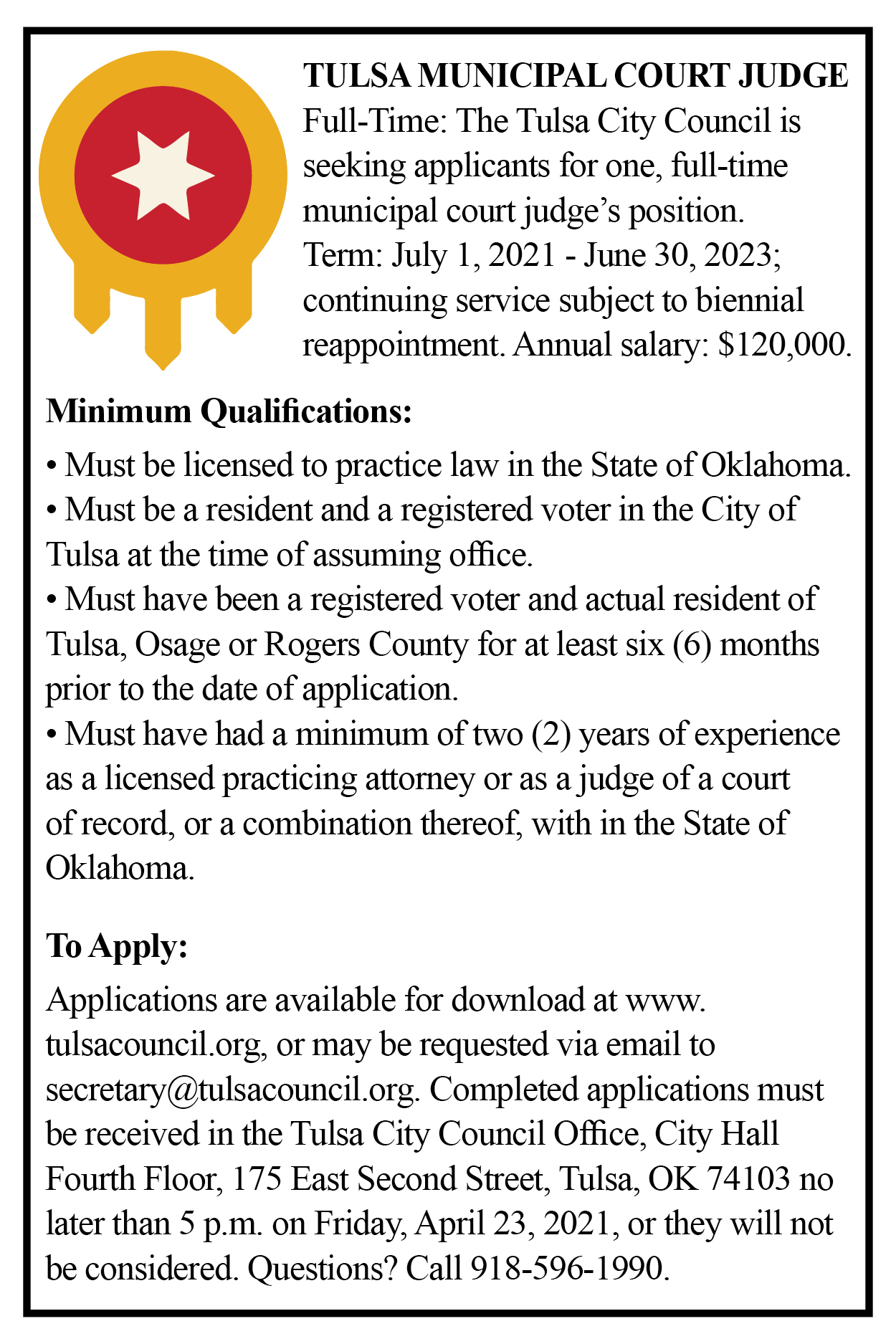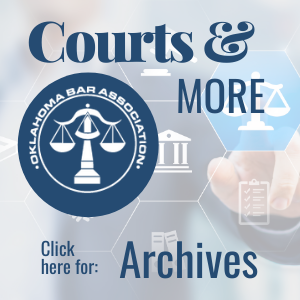

Oklahoma Supreme Court
FRAZIER v. BRUCE
2021 OK 14, 119251
Decided 03/29/2021
¶1 Petitioner Mia Frazier sought to disqualify Tulsa County District Court Judge Tammy Bruce after Judge Bruce granted a continuance to a hearing on Ms. Frazier's motion to enforce visitation. Ms. Frazier's motion to enforce visitation almost immediately followed Real Party in Interest Travis Benavidez's motion to suspend visitation--which raised serious allegations about Ms. Frazier's behavior with the child. Two days before the hearing, which the district court timely set for Ms. Frazier's motion to enforce visitation, Mr. Benavidez requested a continuance, alleging that Ms. Frazier refused to cooperate with the guardian ad litem for an interview about Mr. Benavidez's allegations. The district court granted Mr. Benavidez's request for a continuance, setting the hearing outside of the 21-day deadline of 43 O.S. Supp. 2014, § 111.3 (B), but inside § 111.3(F)'s 45-day decision deadline. Well before the date of the reset hearing, Ms. Frazier sought Judge Bruce's disqualification under Rule 15 of the Rules for District Courts of Oklahoma, arguing the continuance was unauthorized by law and established the appearance of impropriety.
STATE ex rel. OKLAHOMA BAR ASSOCIATION v. McBRIDE
2021 OK 13, SCBD-7034
Decided 03/29/2021
¶1 The Oklahoma Bar Association (OBA), in compliance with Rules 7.1 and 7.2 of the Rules Governing Disciplinary Proceedings (RGDP), forwarded to this Court certified copies of the Information, Supplemental Information, Probable Cause Affidavit, and Motion to Dismiss in the matter of State of Oklahoma v. Michael David McBride, CF-2020-141, in Muskogee County, Oklahoma. This felony case was dismissed and the case was refiled as Muskogee County District Court Case No. CM-2020-560. The OBA also forwarded to this Court certified copies of the Information, Probable Cause Affidavit, Acknowledgment and Waiver of Rights, and Deferment in CM-2020-560. On July 24, 2020, Respondent entered pleas of Guilty to the misdemeanor crime of Driving Under the Influence in violation of 47 O.S.2011, § 11-902 (A)(2), and the misdemeanor crime of Driving with a Suspended License in violation of 47 O.S.2011, § 6-303 (B). The Court deferred judgment and sentence on both matters for one year until July 24, 2021, with the counts to run concurrent to each other, during which time the Respondent was placed on probation.
Oklahoma Court of Criminal Appeals
No published decisions this week.
Oklahoma Court of Civil Appeals
ROWELL v. BD. OF COUNTY COMMISSIONERS OF MUSKOGEE COUNTY
2021 OK CIV APP 7, 118529
Decided 08/13/2020
¶1 In this case, a pretrial detainee at the Muskogee County jail died from injuries incurred while he was being moved about the facility. The decedent's estate brought various tort claims against several parties, including the county, alleging that the decedent's detainers used excessive force and operated with deliberate indifference to his rights. The only claim at issue here is the estate's claim for excessive force premised upon Article 2, Section 30 of Oklahoma's Constitution ( Bosh claim). The trial court dismissed this claim, finding that it was barred by the Oklahoma Governmental Tort Claims Act's (OGTCA) exception to the state's waiver of liability for the "[p]rovision, equipping, operation or maintenance of any prison, jail or correctional facility ...." 51 O.S. §155 (25). We affirm, finding that Bosh claims are subject to the OGCTA for all claims accruing after the 2014 amendments to that statute and that the §155(25) exception applies to immunize the county from liability on the facts as alleged.

Oklahoma Court of Civil Appeals
COCA Division II
118,214 (Companion with Case No. 118,742) – Patricia Bowers Edwards, as Guardian of Robert Drew Bowers, an incapacitated person, Plaintiff/Appellant, vs. Bank of Oklahoma, N.A., Defendant, and InvesTrust, N.A., Appellee. Appeal from the District Court of Oklahoma County, Hon. Richard W. Kirby, Trial Judge. Patricia Bowers Edwards appeals from the trial court’s order filed in 2019 vacating in part an order filed in 2014. Ms. Edwards argues that the reformation portion of the 2014 order was improperly vacated by the trial court. She asserts that where, as here, vacation was granted pursuant to a request filed more than three years after the issuance of the underlying order, the vacation request must be based on a jurisdictional defect appearing on the face of the judgment roll. She asserts that no such jurisdictional defect exists in the 2014 order. We agree. Regardless of whether the 2014 order contains a misapplication of the law of reformation that could have been corrected in a timely appeal, that portion of the 2014 order granting the reformation request was not beyond the jurisdiction of the court and, thus, was improperly vacated in the 2019 order. Ms. Edwards also asserts she did not fail to join all necessary parties. That is, InvesTrust asserted below that all necessary parties were properly joined only if the reformation of the Trusts falls under 60 O.S. 2011 § 175.23(A) of the Oklahoma Trust Act. We conclude the reformation request did properly fall under § 175.23(A) such that Ms. Edwards did not fail to join all necessary parties. Finally, Ms. Edwards asserts the reformation portion of the 2014 order could not have been properly vacated on the equitable grounds proposed by InvesTrust. Indeed, Oklahoma jurisprudence teaches that an attack in equity in the manner proposed by InvesTrust cannot form the basis of a determination that a judgment is void. Accordingly, we conclude the trial court abused its discretion in vacating the reformation portion of the 2014 order on the basis of InvesTrust’s equitable argument. REVERSED. Opinion from Court of Civil Appeals, Division II, by BARNES, J.; WISEMAN, P.J., and RAPP, J. (sitting by designation), concur. March 24, 2021
117,914 — In the Matter of the Estate of: Alfred F. Penner, Deceased, Wilma Penner, Petitioner/Appellant, vs. Anna Kay Garner and Rick Penner, Respondents/ Appellees. Appeal from an Order of the District Court of Pottawatomie County, Honorable John G. Canavan, Jr., Trial Judge. Wilma Penner (Wilma) appeals several decisions of the district court made in connection with the probate of the will of her late husband, Alfred Penner (Alfred). The emphasis of the judicial process in a probate proceeding is to discern and effectuate the decedent’s intent. The burden of proof in the trial of a contest of the probate of a will is upon the proponents of the will to make a prima facie showing that the will is adequate for probate; then the burden shifts to the contestants to establish the issues presented by their contest. In re Estate of Speers, 2008 OK 16, ¶ 9, 179 P.3d 1265. Even though we will weigh the evidence, we will accord some deference to the trial court’s resolution of conflicting evidence because that court had the opportunity to observe the demeanor and conduct of the witnesses. Id. at ¶ 13. The burden of persuasion on the issue of testamentary capacity lies with the party contesting the validity of the will. Id.; In re Estate of Maheras, 1995 OK 40, 897 P.2d 268. Pursuant to the appropriate standard of review, we find no error in the challenged decisions of the district court, and accordingly, the trial court’s order is affirmed. AFFIRMED. Opinion from the Court of Civil Appeals, Division II, by THORNBRUGH, J.; WISEMAN, P.J., and BARNES, J., concur. March 25, 2021
118,468 — Barbara D. Mullins and James M. Mullins, Petitioners/Appellees, vs. Logan McKenna Head, Respondent/Appellant. Appeal from an Order of the District Court of Pawnee County, Honorable Patrick Pickerill, Trial Judge, granting visitation rights to Barbara D. and James M. Mullins (Grandparents). The decree in question was a consent decree. A court typically cannot modify a consent decree without the agreement of both parties unless an independent statutory basis for modification exists. The court can interpret or clarify the decree. We reject the trial court’s apparent legal interpretation that the decree unambiguously provides for grandparental visitation under the circumstances present here. Although the decree is ambiguous regarding what circumstances constitute the “unavailability” of the children’s father, we further reject the interpretation that this ambiguity could be properly clarified as a matter of law by entirely replacing the current provisions with a new, independent right of grandparental visitation. As such, we reverse the decisions of the district court, and remand this matter for further proceedings if needed. REVERSED AND REMANDED FOR FURTHER PROCEEDINGS. Opinion from the Court of Civil Appeals, Division II, by THORNBRUGH, J.; WISEMAN, P.J., and BARNES, J., concur. March 25, 2021
118,874 — Gomaco, Inc., and Baytide Petroleum, Inc., Applicants/Appellants, vs. Oklahoma Corporation Commission and EOG Resources, Inc., Respondents/ Appellees. Appeal from an order of the Oklahoma Corporation Commission granting Appellee EOG Resources, Inc.’s motion to dismiss Appellants’ application to vacate a pooling order. The question before us is whether Appellants’ application to vacate was properly dismissed as an impermissible collateral attack on the pooling order. Our review of the face of the proceedings establishes the Oklahoma Corporation Commission properly dismissed Appellants’ application to vacate the pooling order because this constitutes an impermissible collateral attack on a final order. The Commission’s order granting EOG’s motion to dismiss is affirmed. AFFIRMED. Opinion from the Court of Civil Appeals, Division II, by WISEMAN, P.J.; BARNES, J., and HIXON, J. (sitting by designation), concur. March 26, 2021
COCA Division IV
118,418 – Asset Acceptance, LLC, Plaintiff/Appellee, vs. Timothy O. Markland, Defendant/Appellant. Appeal from an Order of the District Court of Wagoner County, Hon. John Luton, Trial Judge. Timothy O. Markland appeals an order denying his motion to vacate a judgment entered against him and in favor of Asset Acceptance, LLC, in its debt collection action. Because Markland filed his motion more than three years after the judgment was entered and the judgment roll reflects that Markland was personally served with summons in the original action, we affirm the district court’s order denying Markland’s motion to vacate the judgment. AFFIRMED. Opinion from Court of Civil Appeals, Division IV, by FISCHER, V.C.J.; HIXON, P.J., and RAPP, J., concur. March 24, 2021
118,676 [Companion with Case No. 118,747 and Case No. 118,748] – Oklahoma Turnpike Authority, a body corporate and politic, Plaintiff/Appellee, vs. Ronald Lira and Nancy Trait-Lira, Defendants/Appellants, and Hickory Hills Fire Protection District; Wanda Bradley and Richard Korf, Directors, and/or Their Successors; Hickory Hollow Estates Owners Associations; The Oklahoma Board of County Commissioners; and The Treasurer of Oklahoma County, Oklahoma, Defendants. Appeal from an Order of the District Court of Oklahoma County, Hon. Thomas E. Prince, Trial Judge. The defendants, Ronald Lira and Nancy Trait-Lira (collectively Lira), appeal an Order Overruling Defendants’ Ronald Lira and Nancy Trait-Lira Exception to Report of Commissioners. OTA condemned property belonging to Lira. After filing the condemnation action, Commissioners were appointed and returned an award of $106,000.00. Lira filed a timely exception to challenge the necessity of the taking. Both parties filed a request for a jury trial and challenge to the amount of the Commissioners’ Award. OTA took possession of the property, cleared improvements, and began its project construction. Several months later Lira formally requested the payment of the Commissioners’ Award and received the money. Lira’s request and receipt of the Commissioners’ Award were completely voluntary. The request and receipt occurred prior to a hearing on Lira’s challenge to the necessity of the taking of the property. OTA objected to a hearing on necessity and claimed that Lira was barred from the challenge because of the request for and acceptance of the Commissioners’ Award. The trial court agreed and ruled accordingly. This Court holds that the voluntary acceptance of the Commissioners’ Award bars any further proceedings except a challenge to the sufficiency of the Commissioners’ Award. The judgment is affirmed. AFFIRMED. Opinion from Court of Civil Appeals, Division IV, by RAPP, J.; FISCHER, V.C.J., and HIXON, P.J., concur. March 24, 2021
118,747 [Companion with Case No. 118,676 and Case No. 118,748] – Oklahoma Turnpike Authority, a body corporate and politic, Plaintiff/Appellee, vs. DWB Family Trust, by and through Darrin Wesley Brewer and Samantha R. Brewer, Trustees; Darrin Wesley Brewer; and Samantha R. Brewer, Defendants/Appellants, and Advantage Bank, Occupant(s) of the Premises, Oklahoma Gas and Electric Co., Defendants, and Oklahoma County Treasurer, Board of County Commissioners Oklahoma County, Oklahoma, Defendants/Appellees. The defendants, DWB Family Trust, by and through Darrin Wesley Brewer and Samantha R. Brewer, Trustees, Darrin Wesley Brewer and Samantha R. Brewer (Brewer) appeal a judgment in favor of the plaintiff, Oklahoma Turnpike Authority (OTA). The trial court ruled that Brewer had waived and was estopped by their actions to request and withdraw the Commissioners’ Award from asserting an exception to a Commissioners’ Award in OTA’s condemnation action. This case is a companion case to Oklahoma Turnpike Authority v. Lira, Case Number 118,676. The Lira appeal presented the same legal issue, that is: Whether a condemnee who voluntarily requests and accepts the Commissioners’ Award waives or is estopped from pursuing an exception to the Commissioners’ Report which challenges the necessity of the taking. There, the trial court, as here and for the same reason, ruled that the condemnees could not pursue the exception to the Commissioners’ Report because they requested and received the Commissioners’ Award. This Court affirmed. This Court’s Opinion in Lira controls here. Therefore, the judgment of the trial court is affirmed. Okla.Sup.Ct.R. 1.201, 12 O.S.2011, Ch. 15, App. 1. AFFIRMED. Opinion from Court of Civil Appeals, Division IV, by RAPP, J.; FISCHER, V.C.J., and HIXON, P.J., concur. March 24, 2021
118,748 [Companion with Case No. 118,676 and Case No. 118,747] – Oklahoma Turnpike Authority, Plaintiff/Appellee, vs. Thomas Kyle Smith, Jane Doe Smith, Wife of Thomas Kyle Smith, if any, Defendants/Appellants, and Christina Smith, Appellant, Christina Mitchell; John Doe Mitchell, husband of Christina Mitchell, if any; Kathryn M. Small; John Doe Small, husband of Kathryn M. Small, if any; Occupants of the Premises, 773 Cabin Road, Harrah, Oklahoma; Oklahoma Tax Commission; Ford Motor Credit Company; Midland Funding, LLC; City of Harrah, Oklahoma, Defendants, and Oklahoma County Treasurer; Board of County Commissioners of Oklahoma County, Oklahoma, Defendants. Appeal from an Order of the District Court of Oklahoma County, Hon. Natalie Mai, Trial Judge. The defendants, Thomas Kyle Smith and Christina Smith (Smith), appeal a trial court judgment in favor of the plaintiff, Oklahoma Turnpike Authority (OTA). The trial court ruled that Smith had waived and was estopped by their actions to request and withdraw the Commissioners’ Award from asserting an exception to a Commissioners’ Award in OTA’s condemnation action. This case is a companion case to Oklahoma Turnpike Authority v. Lira, Case Number 118,676. The Lira appeal presented the same legal issue as here, that is: Whether a condemnee who voluntarily requests and accepts the Commissioners’ Award waives or is estopped from pursuing an exception to the Commissioners’ Report which challenges the necessity of the taking. There, the trial court, as here and for the same reason, ruled that the condemnees could not pursue the exception to the Commissioners’ Report. This Court affirmed. This Court’s Opinion in Lira controls here. Therefore, the judgment of the trial court is affirmed. Okla.Sup.Ct.R. 1.201, 12 O.S.2011, Ch. 15, App. 1. AFFIRMED. Opinion from Court of Civil Appeals, Division IV, by RAPP, J.; FISCHER, V.C.J., and HIXON, P.J., concur. March 24, 2021
118,305 – Colby Don Vass, Petitioner/Appellee, vs. Wanda Jean Vass, Respondent/Appellant. Appeal from Order of the District Court of Okfuskee County, Oklahoma, Hon. Maxey P. Reilly, Trial Judge. Appellant Wanda Vass appeals the district court’s order determining the effective date of the child support modification in the underlying proceeding. After review of the record and applicable law, we find that the modification of child support became effective on the date the motion to modify was filed. The district court’s order is affirmed as modified by this Opinion. AFFIRMED AS MODIFIED. Opinion from Court of Civil Appeals, Division IV, by FISCHER, V.C.J.; HIXON, P.J., and RAPP, J., concur. March 25, 2021
118,493 – Sheila M. Pittman, Petitioner, vs. Multiple Injury Trust Fund and The Oklahoma Workers’ Compensation Court of Existing Claims, Respondents. Proceeding to Review an Order of a Three-Judge Panel of The Workers’ Compensation Court of Existing Claims, Hon. Brad Taylor. Claimant Sheila Pittman seeks review of an order of a three-judge panel of the Workers’ Compensation Court of Existing Claims, which affirmed the trial court’s denial of her claim for an award of permanent total disability benefits against the Multiple Injury Trust Fund (Fund). The operative date for determining the date of Claimant’s cumulative trauma injury and the liability of the Fund is the 2007 date of awareness. The “any competent evidence” standard of review set forth in Parks v. Norman Municipal Hospital, 1984 OK 53, ¶ 2, 684 P.2d 548, was still in effect on the date in 2007 when Claimant became aware of her cumulative trauma injury, and the Parks standard applies to appellate review. Competent evidence in the record supports the trial court’s denial of this claim for PTD benefits against the Fund and the panel’s order affirming the denial of benefits to Claimant. SUSTAINED. Opinion from Court of Civil Appeals, Division IV by FISCHER, V.C.J.; HIXON, P.J., and RAPP, J., concur. March 25, 2021

Art of the Oklahoma Judicial Center
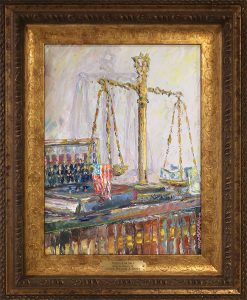
A significant addition has been made to the collection of public art at the Oklahoma Judicial Center. William Bennett Berry has donated a painting of the cover art of the book, “Justice for Sale”, written by his grandfather, distinguished Oklahoma Supreme Court Justice William Aylor Berry who died in 2004. The artist is Justice Berry’s son, Nick Berry, a nationally recognized artist whose work is held in numerous private and corporate collections across the United States.
Chief Justice Richard Darby noted that, “The Oklahoma Supreme Court has attempted to tell the history of the state of Oklahoma, and of the state’s judiciary through the art collection of the Judicial Center. This painting certainly contributes to our story. We hope to resume tours of the Oklahoma Judicial Center Collection later this year.”
Justice Berry served in the military during the Second World War. He resigned his position as Payne County attorney and joined the United States Naval Intelligence Service as an ensign during World War II. He was captured by the Japanese in 1942, and he was a POW for thirty-three months. He escaped once, was recaptured, tried twice, and put under a death sentence. Berry was liberated from Bilibid Prison in 1945. He wrote a book, “Prisoner of the Rising Sun” concerning his ordeal as a prisoner.
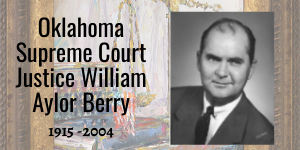 Justice Berry had a long and distinguished legal career. He was elected to the Oklahoma Supreme Court in 1958, for a six-year term, was reelected for second and third terms, and served as Vice Chief Justice and Chief Justice before retiring as a Justice in 1978.
Justice Berry had a long and distinguished legal career. He was elected to the Oklahoma Supreme Court in 1958, for a six-year term, was reelected for second and third terms, and served as Vice Chief Justice and Chief Justice before retiring as a Justice in 1978.
FRIDAY CLE | April 2
Crash Course on the Science of Opioids

Attorneys not only encounter opioids in everyday news. Criminal attorneys hear of these drugs on a much too regular basis when it comes to impairment, fatalities, and street drug dealings. What pearls of science do attorneys need to know about these drugs? How do they work? How do they poison and take the lives of so many? Where do they fit into postmortem cases? Where is fentanyl found? How does naloxone work and when does it work and when does it not? These questions and more will be answered during this one-hour crash course on the science of opioids for attorneys with Dr. Allison Muller, board-certified toxicologist (D.ABAT), fellow of the American Academy of Clinical Toxicology (FAACT), and registered pharmacist with over 20 years’ experience in the field of clinical toxicology.
Learning objectives:
 1. List 3 effects of opioids on the body
1. List 3 effects of opioids on the body
2. State two examples of unexpected sources of opioids
3. State one example of a drug that can intensify opioid toxicity
4. Explain pitfalls in interpreting drug screen results as they relate to opioids
5. List 2 reasons for the presence of morphine in the blood
Click here to REGISTER.
Notice of Hearing

TO MEMBERSHIP IN THE OKLAHOMA BAR ASSOCIATION
REINSTATEMENT HEARING
MICHAEL STEVEN MORGAN, SCBD # 6981
9:30 a.m., Wednesday, April 28, 2021
Any person desiring to be heard in opposition to or in support of a petition may appear before the Professional Responsibility Tribunal at a scheduled hearing located at the Oklahoma Bar Center at 1901 North Lincoln Boulevard, Oklahoma City, Oklahoma. Any person wishing to appear should contact Gina Hendryx, General Counsel, Oklahoma Bar Association, P.O. Box 53036, Oklahoma City, Oklahoma 73152, telephone (405) 416-7007.

Whether you are hiring, looking for a career move, offering office space or searching for a service - let the OBA Classified service help. For advertising rates and details, at advertising@okbar.org, or by telephone (405) 416-7018.
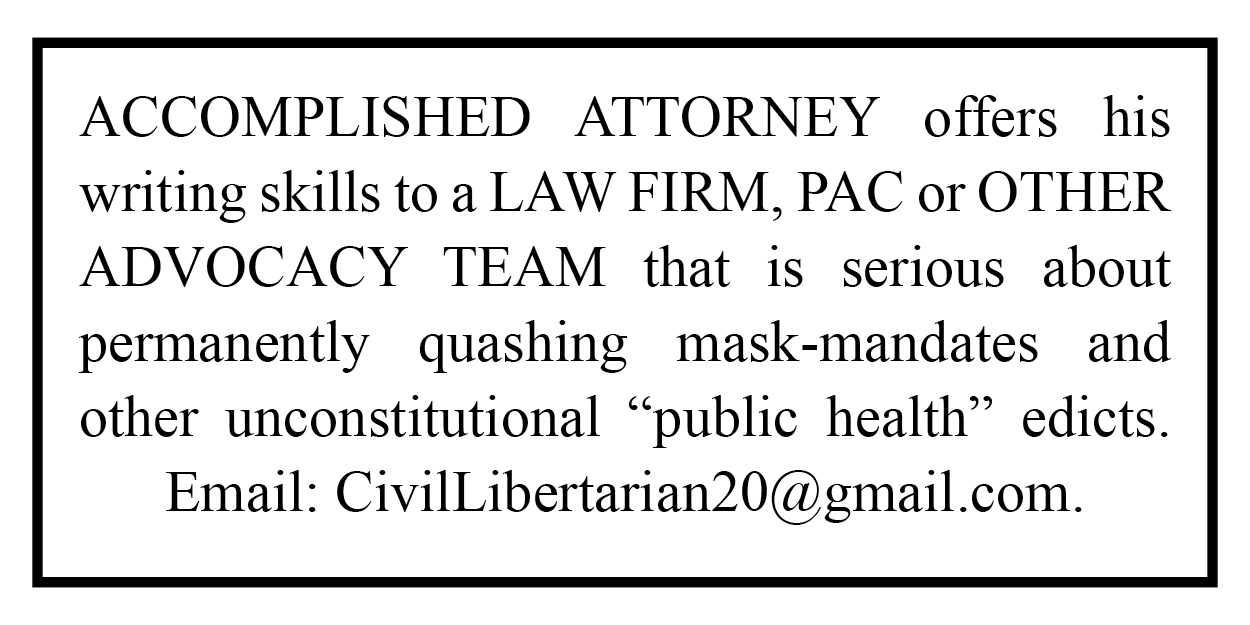
Automation Tools for Lawyers
By Jim Calloway, Director OBA Management Assistance Program
Lawyers have long had a love-hate relationship with office technology. Lawyers love tech tools that save time (particularly on tasks not being billed to clients) and money. So, long ago word processing software tools that meant not having to retype an entire document to edit it were instantly adopted by law firms and often the reason for the purchase of the first law office computers.
In the same way that word processors replaced typewriters, today’s technology tools can automate many office processes. Here’s a simple and easy-to-accomplish example. Most law firms today send out more emails than traditional correspondence. It is fine to use email casually with friends. But today’s lawyers do not want to send out professional emails with typos and misspellings. You can set up Outlook to do one last automated spellcheck on every email. See How to Force Outlook to Spellcheck Emails Before They’re Sent from How-To Geek.





